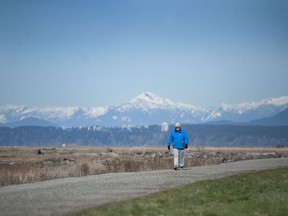Metro Vancouver has been warmer than normal this winter but meteorologists say Arctic air is on its way, dropping temperatures below zero.

Don’t pack away your tuques just yet, Metro Vancouver.
Although it has been a warmer-than-normal winter so far, meteorologists say nighttime lows will dip below zero starting Thursday night.
In a posting on the Environment and Climate Change Canada website on Wednesday, meteorologists say an Arctic air mass will bring below-seasonal temperatures to Metro from Friday to at least next Wednesday.
The note says that could affect vulnerable populations and agricultural vegetation.
Lisa Erven, a meteorologist with Environment and Climate Change Canada, said daytime highs in Metro Vancouver haven’t dropped below 5C yet this winter. The coming cold front will drop those daytime highs to around zero, with overnight lows of -3 to -5.
“As we move into Friday, and certainly into the weekend, we do have an air mass coming down from the north. It’s not as robust of an Arctic front as we have seen in previous years, but it is a cooler air mass than normal, and what that will do is drop both our daytime highs and our overnight lows to about 5C below normal,” said Erven on Wednesday.
The forecast also calls for mostly sunny weather into next week with no precipitation.
While there’s no snow expected, Erven said with the colder weather persisting into next week, any storm that moved in from the north could bring flurries.
“We will be watching the weather pattern to see if any storms do come in off the Pacific and from what direction they approach. If they come down from the northwest, then they’re going to be colder storms and there’s a high likelihood for snow even down to lower elevations,” said Erven.
“However, if those storms approach more from a southwesterly direction, well, that brings in more mild temperatures, and then it’s just rain in the lowlands and snow up high.”
Erven said it’s unlikely this cold weather will trigger a Arctic air warning but it won’t be what Metro Vancouver residents have experienced.
“It’s a shift in the weather pattern and with such mild conditions that we’ve had so far this winter, it just might catch people a bit off guard,” she said, adding that vulnerable populations, such as homeless people or those who work outdoors, will need to be prepared.
Temperatures hit a high of 12.9 at one point in December, a few degrees below a temperature extreme of 14.9 C set on Dec. 26, 1980.
Chris Doyle, also a meteorologist with Environment and Climate Change Canada, told Postmedia earlier this month that the La Niña weather event that was forecast has been slow to materialize and is expected to be much weaker than originally forecast.
With files from Nathan Griffiths